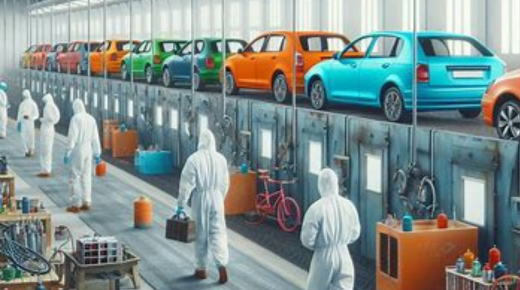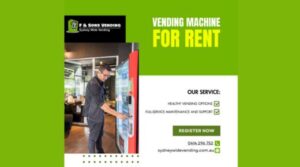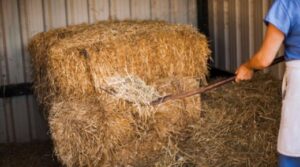
paint spray booths
Paint spray booths are essential for achieving high-quality finishes in various industries, from automotive to aerospace. However, the complex chemical interactions that occur in these environments are critical to understanding for maintaining safety and achieving optimal results. This blog delves into the intricacies of these interactions and their implications for different types of paint spray booths, including automotive paint spray booths, industrial setups, and custom solutions.
The Basics of Chemical Reactions in Paint Spray Booths
Chemical reactions in paint spray booths primarily involve solvents, resins, pigments, and curing agents. When paint is sprayed, these components interact to form a uniform, durable coating. In an industrial spray paint booth, the scale of these reactions is much larger compared to a small spray paint booth or a home spray paint booth. Understanding these reactions helps in optimizing the paint application process and ensuring consistent results.
The Role of Solvents
Solvents are a key component in paint formulations, used to dissolve or disperse other components. In a professional spray paint booth, solvents must evaporate at a controlled rate to allow proper film formation. If solvents evaporate too quickly or slowly, it can lead to defects such as blistering or poor adhesion. High-tech spray paint booths often include sophisticated controls to manage solvent evaporation rates, ensuring a high-quality finish.
Resin and Pigment Interactions
Resins and pigments interact to form the film and provide color in paint coatings. In a custom spray paint booth, the choice of resin and pigment can be tailored to specific requirements, such as durability, gloss, and color stability. These interactions are influenced by factors like temperature and humidity, which are carefully controlled in high-efficiency spray booths to achieve the desired results.
Importance of Curing Agents
Curing agents, or hardeners, are added to paint to initiate a chemical reaction that converts the liquid paint into a solid film. In a large paint spray booth, the curing process is critical for ensuring that the paint film attains its full mechanical properties. The curing reaction generates heat, which must be managed to avoid defects. Eco-friendly spray paint booths often use low-emission curing agents to reduce environmental impact while maintaining performance.
Managing Volatile Organic Compounds (VOCs)
Volatile Organic Compounds (VOCs) are emitted during the painting process and can pose health and environmental risks. In a ventilated paint spray booth, proper ventilation and filtration systems are essential to capture and treat VOCs. Advanced industrial spray paint booths employ sophisticated air handling systems to minimize VOC emissions, ensuring a safer working environment and compliance with regulations.
Temperature and Humidity Control
Temperature and humidity play significant roles in the chemical interactions within a paint spray booth. In an automotive paint spray booth, maintaining consistent temperature and humidity levels is crucial for achieving a uniform finish. Fluctuations can affect solvent evaporation, curing times, and the final appearance of the coating. High-tech spray paint booths are equipped with climate control systems to maintain optimal conditions, ensuring reliable results.
Impact of Airflow and Ventilation
Airflow in a paint spray booth affects how paint particles are transported and deposited on the surface. In a small spray paint booth, adequate airflow prevents overspray and ensures even coating. In a large commercial spray paint booth, airflow must be carefully managed to avoid turbulence that can cause defects. Ventilated paint spray booths are designed to optimize airflow patterns, enhancing both safety and quality.
Safety Considerations
Safety is paramount in paint spray booth environments due to the presence of flammable solvents and chemicals. Proper spray paint booth installation includes features such as explosion-proof lighting, fire suppression systems, and grounding to prevent static discharge. Regular spray paint booth maintenance ensures that safety systems are functional and that ventilation filters are not clogged, reducing the risk of accidents.
Environmental Concerns and Solutions
Environmental concerns are increasingly important in paint spray booth operations. Eco-friendly spray paint booths use waterborne paints and advanced filtration systems to reduce emissions and waste. These booths are designed to minimize the environmental footprint while maintaining high performance, aligning with regulatory requirements and sustainability goals.
Innovations in Paint Spray Booth Technology
Advancements in paint spray booth technology continue to improve the control of chemical interactions. High-tech spray paint booths feature automated systems for precise paint application, real-time monitoring of environmental conditions, and advanced filtration technologies. These innovations enhance productivity and ensure consistent, high-quality finishes across various applications.
Choosing the Right Booth for Your Needs
Selecting the appropriate paint spray booth depends on the specific needs of the application. For automotive applications, a spray paint booth for cars with advanced climate control and filtration is essential. For DIY enthusiasts, an affordable paint spray booth or a home spray paint booth provides a cost-effective solution without compromising on quality. Portable paint spray booths and mobile spray paint booths offer flexibility for on-site projects, while custom spray paint booths can be tailored to meet unique requirements.
Understanding the chemical interactions in paint spray booths is crucial for achieving optimal results and maintaining safety. By managing factors such as solvent evaporation, curing, airflow, and environmental conditions, operators can ensure high-quality finishes and compliance with safety and environmental standards. Whether in an automotive, industrial, or custom setting, the principles of chemical interactions remain central to the success of paint spray booth operations.








